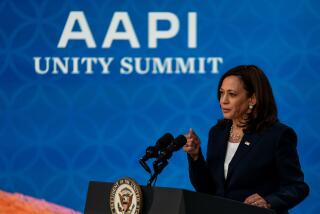For Asians, ‘Great Wall’ Must Break
If you are a white male aspiring to management or a prized promotion, imagine a scenario at your firm in which nearly all of your co-workers are of Asian ancestry.
Pretend being an object of gossip at an office party because of your blond hair and round eyes. Imagine that your Asian boss has sidled to your desk and confided, “Listen, we’re lucky to have you because there are so few good white (lawyers, actors, writers) around.”
But the paths to promotion, to corporate power and riches, are blocked. Almost all of the top executives in your firm are Asian--part of the company family, the Eastern version of the old boys’ network. A bit disconcerting? That scenario--in reverse, of course--is a daily reality for scores of Asian-Americans and other minorities who have ventured into the white business arena. Despite astounding strides made in education, the sciences, medicine and other fields, talented Asian-Americans find themselves locked out of influential, high-powered jobs.
As such, they have been called “high-tech coolies” and “middle-men minorities.” Recent news reports refer to the “Great Wall” and the “glass ceiling” that they must break through to achieve managerial success.
Asian-Americans make up 8% of all professionals and technicians in the private sector, but only 1.3% of all managers, according to the U.S. Equal Employment Opportunity Commission. A recent study by the U.S. Commission on Civil Rights confirmed that Asians overall are under-represented in corporate managerial positions. Asian men and women make 10%to 30% less than whites in general, a UC Berkeley study has found. At UC Berkeley there are only two Asians among 102 administrators at the campus, even though Asian students make up one-fourth of the school’s 22,000 undergraduates.
Why the dearth of Asian-Americans in corporate seats of power? Obviously, racial and cultural barriers still linger. Despite lightning assimilation of Asian-Americans, they do not feel fully at ease with whites, and vice versa; the East is far from meeting the West on the playing fields of office politics and management style.
Good old-fashioned racism, mostly masked or subconscious, is one villain. Stereotypes still thrive. Asian-Americans are often pigeon-holed by whites as bland, intellectual nerds or sultry sex goddesses.
William Ouchi, a UCLA management professor, says that white executives dismiss Asian-Americans as technicians who are too timid and narrowly trained to make it as company leaders. Today there are few Asian-American Donald Trumps and Lee Iacoccas, wheeling and dealing, feeding ethnic aspirations.
Swayed by stereotypes, white bosses may pass over Asian-Americans for plum assignments. They may condescend to them. Or they may judge them too harshly when they stumble, given the “whiz-kid” stereotype. It’s no secret among minorities in the corporate world that they must work harder than white employees to prove themselves.
But Asian-Americans must take part of the blame. In many ways they bring their ancestral homelands’ values into a white corporate culture, like gawky teen-agers not dressed right for a Western dance. The clash of values is not unexpected.
White executives look for rugged individualists who are aggressively competitive and who challenge conventions. In contrast, many Asians are taught to value and obey the family, the group.
The Confucius values of Jen and Li, for instance, refer to the love that binds a man to his family and sovereign--and to rules of propriety that govern ties between, say, a father and his son. Moreover, studies in the 1960s and 1970s suggest that Chinese and Japanese-American students are less independent than whites and more likely to respect authority.
White employees on the fast track have another edge: They tend to be outspoken and articulate in public. On the other hand, many Asian-Americans, still wedded to the values of their homeland, may hide their opinions in corporate settings or shy away from public appearances.
In some cases the language may even be subtle and silent; the Japanese call it ishin denshin , or unspoken communication. A knowing glance, an angry frown, can convey infinitely more than a string of clumsy words.
One point is striking: Relatively few Asian-Americans go into law, media, politics, psychology and other fields where strong verbal and social skills are a must. Some social scientists theorize that most Asian-American students plunge into majors like engineering, biology and medicine because merit can be measured more fairly in the laboratory.
Cultural roadblocks aside, I’m optimistic. The sheer size and talent of the Asian- American work force and the coming era of the Pacific Rim will compel white-run companies to start promoting Asian-Americans.
Most important, Asian-Americans are tough, resilient people--like bamboo. From the racist anti-immigration laws at the turn of the century to the World War II internment of Japanese-Americans to civil-rights victories of late, Asian-Americans have always found ways to persevere. They’ll soon prove their mettle on the corporate battlefield.
More to Read
Inside the business of entertainment
The Wide Shot brings you news, analysis and insights on everything from streaming wars to production — and what it all means for the future.
You may occasionally receive promotional content from the Los Angeles Times.










